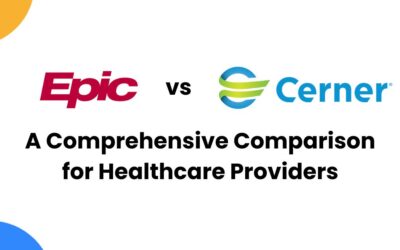The Guide to Custom EHR Application Development [Features + Benefits]
Electronic health records are popular and being rapidly adopted by healthcare providers all over the world. Adopting this type of technology means healthcare providers can improve the quality of healthcare delivery like never before. EHRs are not just digital versions of patient charts, they’re powerful tools that help providers in daily operations.
However, generic EHR solutions often fall short of addressing the unique needs of specific healthcare practices. That’s where custom EHR application development steps in. It offers tailored features and functionalities to meet the exact demands of providers.
In this guide, we’ll share the custom EHR development guide, features, and benefits.
Electronic Health Records and It’s Market Trends
Electronic health records are a digitalized version of paper health records. Healthcare practitioners can embrace, use, and deploy it to safely store patient medical records.
Patient demographics, medical history, progress notes, vital signs, test findings, vaccinations, treatment plans, radiology reports, and other information are managed by the providers using EHRs, to which authorized individuals are granted access.
In 2020, the global market for developing EHR systems was valued at almost $30 billion, and by 2026, it is projected to reach $40 billion. This massive growth has various advantageous factors influencing the wider adoption rate in the US, and worldwide, and the following trends:
- Development of preventative healthcare strategies and telemedicine
- Global medical data digitization is accelerating.
- Complete e-prescription software adoption
- The creation of mechanisms for scheduling medical appointments
- Creation of electronic hospital administration systems
- New prospects for highly customized medical treatment with deep, human-centered analytics of health data
- The Internet of Medical Things is being widely implemented.
- A worldwide trend to abandon the “pen-and-paper” method in healthcare
- the capacity to quickly compile medical data from many sources.
Advantages of Using Electronic Health Records
EHRs are not just managing and storing patient health records. It has various features and functionalities that benefit healthcare providers’ daily workflow.
For instance, medical billing is the most complex task in healthcare.
EHR systems often have medical billing and coding features that simplify the entire billing process with the help of coding assistance tools, speeding up and automating claim submission processing, translating clinical documentation into charge codes, and denial management.
- Reduce manual time-consuming tasks.
- Improve clinical decision-making for a smooth workflow.
- Increase productivity by 10 times.
- Enhance healthcare quality.
- Handle administrative responsibilities with ease.
Key Features of Custom EHR
Firstly, EHRs are made for storing and managing patient health records.
So, it has basic features which include patient profiles, and capabilities of sharing health data securely. Apart from that, custom EHR has various features:
- Patient Profiling: Beyond typical medical records, profiling features give medical professionals a comprehensive picture of their patients.
- Automated Data Acquisition: Clinicians may now nearly completely automate the process of manually entering patient data into the system, eliminating the need for them to put in extra hours.
- Dashboards for Healthcare Personnel: With centralized dashboards, medical personnel may obtain all the data they require without having to switch between windows or do a lot of work.
- Scheduling & Reminders: Healthcare teams may efficiently plan their days with task management dashboards linked to appointment scheduling features. Additionally, notifications can guarantee that neither patients nor physicians overlook important procedures like immunizations, refills, or visits.
- Analytics & Reporting: Healthcare professionals can identify trends in patient conditions and anticipate possible hazards with the use of advanced analytics.
- Billing & Financial Management: By integrating insurance, billing, and subscription management tools with appointment scheduling systems, integrated finance modules expedite the billing process.
- Telehealth: Integrating custom EHRs with video and audio conferencing solutions to provide virtual primary care sessions can improve patients’ access to healthcare.
Related: The Top Features a Behavioral Health EHR Must Have
Benefits of Implementing Custom EHR for Healthcare Practice
Custom EHR offers numerous advantages over general EHR systems. Here are some of the benefits of implementing it in healthcare practices:
1. Intuitive and Easy-to-Use Interface
EHR needs to be user-friendly. Otherwise, the chaotic screen transitions and excessive mouse clicks make it challenging for clinicians to work on the system.
This will ultimately lead to provider burnout and patient data mishaps.
By providing interfaces suited to organizational workflows, custom EHRs help avoid these problems and guarantee more efficient operations and less fatigue among clinicians.
2. Greater Adaptability and Growth Potential
Custom EHRs are designed to interact easily with current systems. They allow for updates and flexibility in changing healthcare IT environments. In contrast to off-the-shelf options, custom EHRs ensure flexibility and strong interoperability by integrating with your company’s tools and workflows.
3. Seamless Integration with Specialty Clinics
The subtleties of particular therapeutic settings are frequently overlooked by generic EHRs.
Custom EHRs, on the other hand, are made specifically for the organization’s industry, enhancing process integration and giving physicians the resources they need right away.
4. Efficient Management of Patient Health Records
With HIPAA-compliant features, custom EHRs simplify secure handling of data management by:
- Cut down on paperwork and avoid repetition.
- Avoid loss, alteration, or unwanted access.
- Make medical records quickly and securely accessible.
- Provide patients with transparent and accurate health information.
- Exam reports, test results, and patient histories should all be centralized.
5. Optimized Patient Care and Treatment Results
Custom EHRs give medical practitioners automated warnings and insights to help them make decisions:
- When writing e-prescriptions, let prescribers know about any drug conflicts.
- Early detection of allergies or symptoms allows for treatment modifications.
- Provide information about ancillary diagnoses to improve treatment strategies.
- Give vital information about drug intolerance to emergency teams.
6. Boosted Revenue for Healthcare Providers
Integrated EHRs improve financial performance and expedite processes by:
- Coordinating patient information amongst departments.
- Ensures accurate and thorough medical records.
- Reducing prescription and treatment-related medical mistakes.
- Automating insurance and billing procedures.
- Promoting evidence-based procedures to strike a balance between provider interests and patient pleasure.
Related: The Ultimate Guide to EMR/EHR Customization & Integration
The Complete Pathway for Custom EHR Development
Suppose the custom EHR development process needs to be smooth. In that case, A detailed pre-deployment study, a well-defined roadmap, a clear project strategy, and open communication between the healthcare provider and the vendor are important.
It will help to increase the chance of successful custom EHR development and implementation.
1. Discovery and Requirement Analysis
Initially, practices need to evaluate the basics of custom EHR development. This includes the features of the Custom EHR that resonate with practice, user-friendly and intuitive interface, and capabilities.
Then assemble a team for the development process. The team must consist of:
- Project manager
- A business analyst
- Clinicians representing all end-users
- IT department expert.
The main aim of this is the ensure deciding which EHR workflow needs to be enhanced, updated, or automated, and how the interface looks.
The development team will provide a complete solution with functionality that either completely satisfies or is beyond the client’s expectations by the end of this step. They identify the tech stack, develop the system architecture, draft the fundamental design, and suggest any necessary modifications to the company’s software and hardware.
2. Custom EHR Development
Custom EHR takes around 4 to 12 months to develop. It depends on the healthcare organization, size, and the system’s complexity. This process consists of three major steps:
Creating the roadmap and delivering a custom EHR solution
- First, developers must create a detailed plan with well-defined milestones.
- A workable prototype containing crucial components needs to be created and distributed to physicians for input.
- Changes to procedures and the system are implemented based on user feedback.
Integrating with other healthcare applications
- Connecting EHR with other healthcare systems such as lab systems, hospital management systems, medical billing systems, and BI tools will enhance interoperability.
- Ensure that health data flows seamlessly and securely between all integrated technologies.
All-round quality assurance
- Maintain compliance with standards such as HIPAA, GDPR, and PIPEDA.
- Conduct extensive testing to ensure system functionality and security.
3. Implementation and Deployment
After the completion of custom EHR development, thoroughly tested, and meets the quality and all security standards, it is now ready for deployment. During the process of implementation and deployment:
- Clinicians’ feedback is incorporated to improve the system.
- The EHR is connected with other medical applications to ensure smooth operation.
- Primary users should be trained on basic EHR instructions, as well as receive any essential security training.
- Conduct advanced training sessions for staff that require additional abilities.
4. Post-Implementation Support
More than implementation and deployment, it is important to maintain optimization, access, and upgrade on-going regularly This is important to ensure that the system scales as the practice grows.
Contact your technological partner to learn about possible post-implementation assistance, or employ a dedicated team for these responsibilities.
This guarantees that your EHR continues to fulfill the needs of modern healthcare.
CapMinds Custom EHR Application Development Solution
CapMinds offers a comprehensive solution designed to create custom EHR applications tailored to meet your healthcare practice’s unique requirements.
We are a team of seasoned professionals with extensive expertise in healthcare technology.
CapMinds’ custom EHR development services address the specific needs and challenges of healthcare providers across specialties.
- CapMinds develops EHR applications with intuitive interfaces and workflows that align with your practice, ensuring seamless navigation and enhanced efficiency.
- Our solutions include creating robust custom modules for scheduling, patient management, documentation, and reporting, designed to improve operational workflows.
- We also specialize in integrating advanced features such as e-prescriptions, telehealth capabilities, and remote patient monitoring into your custom EHR application.
- Our experts provide end-to-end solutions, including data migration, interoperability, and compliance with healthcare standards like HL7 and FHIR.
- With a focus on security and scalability, our applications are built to support growth while safeguarding sensitive patient data.
Whether you’re looking to build a tailored solution from scratch or need to enhance your current system, CapMinds’ Custom EHR Application Development Solution is your trusted partner.
Contact us today to transform your vision into a fully functional, cost-effective EHR application that empowers your healthcare practice to succeed.
![The Guide to Custom EHR Application Development [Features + Benefits]](https://www.capminds.com/wp-content/uploads/2024/11/Blog-Featured-Images-2024-11-25T110915.039-1024x536.jpg)



